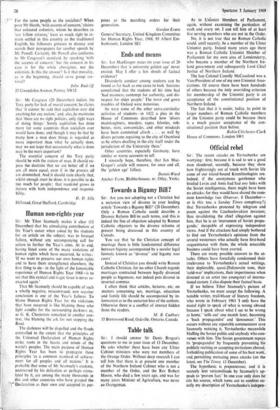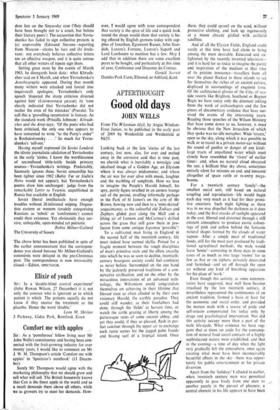Official rebel
Sir: The recent attacks on Yevtushenko are worrying: first, because it is sad to see a good man slandered; secondly, because they show how frighteningly out of touch with Soviet life some of our island-bound Kremlinolbgists are. Indeed, if the anonymous gentlemen who briefed Levin and Amis had had any links with the Soviet intelligentsia, there might have been no attacks; for they would have shared the com- mon knowledge (see Observer, 8 December— or is this, too, a Sunday Times conspiracy?) that Yevtushenko protested by telegram and poem against the Czechoslovakian invasion; thus invalidating the chief allegation against him, that he is an 'instrument of Soviet propa- ganda,' incapable of expressing independent views. And if the attackers had simply bothered to find out Yevtushenko's opinions from the several westerners who actually have first-hand acquaintance with them, the whole miserable business could have been averted.
There are many possible answers to the at- tacks. Others have forcefully condemned their irrelevance to Yevtushenko's actual writings, their deplorable, quasi-Zhdanovite tone, their `cold-war' implications, their impertinence when directed at an artist (no youngster) of interna- tional stature. I also dispute their factual basis.
If we believe Tibor Szamuely's picture of Yevtushenko, we must accept the following. A notable writer, trail-blazer of literary freedom, who wrote in February 1963 'I only have the moral right to speak of what is wrong abroad because I speak about what I see to be wrong at home,' sells out' one month later, becoming a 'hack propagandist' and 'denouncer.' This occurs without any reputable commentator save Szamuely noticing it, Yevtushenko meanwhile bluffing the Soviet public and anybody who con- VenieS with him. The Soviet government repays its 'propagandist' by frequently preventing his publicly reciting or accepting invitations abroad, forbidding publication of some of his best work, ancipermitting menacing press attacks (on the latest, see The Times, 13 December).
The hypothesis is preposterous; and it is scarcely lent verisimilitude by Szamuely's ap- peals to 'proven fact.' In one case only does he cite his source, which turns out to confirm ex- actly my description of Yevtushenko's indepen- dent line on the Sinyaysky case ('they should have been brought not to a court, but before their literary peers'). The accusation that Yevtu- shenko has failed to sign collective protests is (a) unprovable (Edmund Stevens—repOrting from Moscow—claims he has) and (b) irrele- vant: not everybody believes collective letters are an effective weapon, and it is quite untrue that all other writers of repute sign them.
Setting great store by the events of March 1963, he disregards basic data : what Khrush- chev said on 8 March, and when Yevtushenko's Autobiography appeared. During that month many writers were attacked and forced into (equivocal) apologies; Yevtushenko's only speech 'disputed the sharp criticism directed against him' (Literaturnaya gazeta); its 'tone clearly indicated that Yevtushenko did not realise the crux of his mistakes' (Pravda). To call this a 'grovelling recantation' is fantasy. As the standard work (Priscilla Johnson: Khrush- chev and the Arts) says: 'Of the poets who had been criticised, the only one who appears to have consented to write "to the Party's order" is Rozhdestvensky. . . .' So much for Yevtu- shenko's 'sell-out.'
Having myself expressed (in Soviet Leaders) the idiotic journalistic adulation of Yevtushenko in the early 'sixties, I know the worthlessness of secondhand tittle-tattle beside primary sources—Yevtushenko's writings. Predictably, Szamuely ignores these. Soviet censorship has been tighter since 1962 (Babiy Yar or Stalin's Heirs would not appear), but Yevtushenko's poems show him unchanged : judge from the remarkable Letter to Yesenin, unpublished in Russia but available in English.
Soviet liberal intellectuals have enough troubles without ill-informed sniping. Dogma- tists eastern or western (crudely categorising Russians as `rebels' or 'conformists') cannot credit their existence. Yet obstinately they sur- vive; unbuyable, open-minded yet patriotic.
The above letter has been published in spite of the earlier announcement that the correspon- dence was closed because Mr Milner-Gulland's comments were delayed in the pre-Christmas post. The correspondence is now irrevocably closed.—Editor, SPECTATOR.



































 Previous page
Previous page